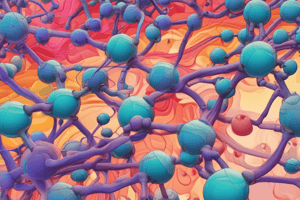Podcast
Questions and Answers
What is the temperature range for rubber polymerization?
What is the temperature range for rubber polymerization?
- -100°C to 50°C (correct)
- 50°C to 200°C
- 0°C to 100°C
- 200°C to 300°C
Which type of polymerization involves the presence of the monomer alone?
Which type of polymerization involves the presence of the monomer alone?
- Suspension polymerization
- Solution polymerization
- Bulk polymerization (correct)
- Emulsion polymerization
In which type of polymerization does the polymer precipitate after a certain degree of polymerization?
In which type of polymerization does the polymer precipitate after a certain degree of polymerization?
- Bulk polymerization
- Solution polymerization
- Suspension polymerization (correct)
- Emulsion polymerization
What happens to the medium during polymerization if the polymer formed is soluble in its monomer?
What happens to the medium during polymerization if the polymer formed is soluble in its monomer?
Which polymerization technique allows for relatively pure polymers with a high molar mass to be obtained?
Which polymerization technique allows for relatively pure polymers with a high molar mass to be obtained?
Which polymerization technique involves an initiator and/or catalyst miscible in the monomer?
Which polymerization technique involves an initiator and/or catalyst miscible in the monomer?
Flashcards are hidden until you start studying
Study Notes
Polymerization Techniques
- Polymer synthesis can occur under various conditions, with reaction temperatures ranging from -100°C to 300°C.
- Different types of polymerization include bulk, solution, suspension, emulsion, and gas phase polymerization.
Mass Polymerization
- Takes place in the presence of the monomer alone, which acts as both reagent and solvent.
- May require an initiator and/or catalyst, miscible in the monomer.
- If the polymer formed is soluble in its monomer, polymerization occurs in a homogeneous medium, and viscosity increases as the medium becomes solid (e.g., polystyrene).
- If the polymer formed is not soluble in its monomer, the polymer precipitates after a certain degree of polymerization (e.g., polyvinyl chloride from vinyl chloride).
- Advantages of mass polymerization include relatively pure polymers with high molar mass.
- Can be carried out directly in a mold, as in the case of polyurethane (PU) formation from isocyanates and alcohols, resulting in high degree of polymerization and fast kinetics.
Studying That Suits You
Use AI to generate personalized quizzes and flashcards to suit your learning preferences.





